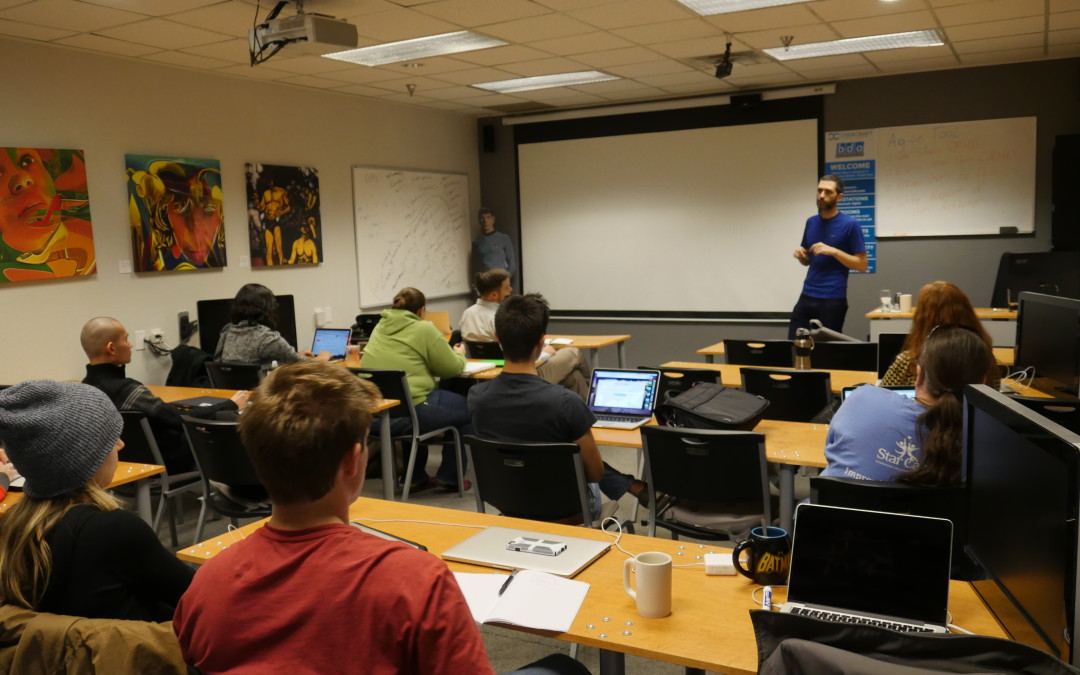For last week’s #CCLunchLearn, Andrew Morton, Technical Lead for Recurly, joined our students to talk about the technical interview process when bootcamp graduates start looking for work.
Andrew is so passionate about the subject that he reached out to CodeCraft to speak to our cohort. He has written his own detailed and immensely useful blog post on the topic: Hiring Advice for Dev Bootcamp Graduates.
In the blog he states that he has met quite a few graduates from Bootcamps previously and, “As I’ve looked through their resumes and projects, I’ve noticed some common shortcomings and wanted to offer a few thoughts on how to address them.”
His blog post offers a wealth of knowledge on how to position yourself well, but a few ideas he brought to our students in the presentation are also worth highlighting.
Differentiate yourself using the background you brought before bootcamp.
This is something we tell our students often. Most of our bootcamp students come from diverse and usually non-tech-oriented backgrounds. Embrace this and use it as a position of confidence. What experience in your past could be valuable in a new situation? If you were a manager for instance, that displays your ability to work with and lead teams. If you were a sales rep, you know how to work well with customers and position your ideas well in team environments.
Be the “______” that graduated bootcamp, not just the third graduate a hiring manager is seeing. That’s to say, be the team leader, the business savvy entrepreneur or the customer experience expert that you were before, now with additional skills you need to enter tech.
You need more than just a GitHub.
Your GitHub account lists projects you’ve worked on in the order you worked on them, but that’s not enough. In order to make it useful to 3rd party viewers, help them understand the “what” and the “why” behind your projects. Include a comprehensive readme with good commentary or otherwise contextual background that explains what you did on a project, the skills you learned and why it is worth looking at. Also, make sure you host your project and that it is accessible/up for people to find and check out. Ghost or heroku are great hosting options for this.
This helps people explore, play and experiment with your apps in a real-life fashion. If it is limited in scope or partially functional, make the instructions/caveats explicit. Hiring managers do not want to have to “figure out” what your app is supposed to do and nothing is more frustrating than spending 5 minutes stuck and lost.
Test your project files with supervision and review.
Ask some colleagues who would be relevant to your project to use your app. The goal here is for you to see where they click, to see how long it takes them to “figure out” what your app is supposed to do. What was intuitive and implicit to them? What isn’t clear right away? Answering these questions in a friendly environment first will help you ensure you’re displaying tangible value behind your work to your potential future employer.
The readme is a great way to emphasize what you did. In addition to explaining how to use your app, it gives you the ability to explain WHY you did it in context. It allows you to highlight what you learned in doing the project as well as what skills you developed. Equally important it enables you to explain why you did this project, be it a passion project, to learn a challenging subject, or to play with a new framework to keep up with emerging technology. All of those reasons are useful and important to hiring managers looking for creative, passionate and curious/inquisitive people to add to their teams.
Additional Tip from Andrew: “Put a screenshot in your readme - then I can see things I wouldn’t have… ‘oh, you know how to use Bootstrap, etc’”
Appreciate that you are junior - be comfortable knowing what you don’t know
Be open to constructive feedback. Recognize that you are meeting with people you will be learning from. You are going to be working with people that have been in those systems and architectures for much longer than you. If at any time during the interviews you get stuck, ask for help or if you can you look at the documentation. Certainly, “if you don’t know the answer, don’t bullshit.”
“Hiring managers”, Andrew explained, “don’t want to throw someone into the pool and watch them drown. You start junior developers with simple stuff.” That said, make sure you understand and sell where you DO add value - core coding fundamentals are important as are the unique career/personality qualities that you brought from your previous career.
Thanks again to Andrew and Recurly for lending us your time and expertise! If you want to learn more about Andrew and what he is working on, subscribe to his blog and follow him on twitter @drewish!
Make sure to stay tuned for more recaps on all the amazing guests that stop by CodeCraft to share their wealth of knowledge! If you want to know more about CodeCraft and the work produced by students here, stop by our graduates’ Demo Day and Holiday Mixer, here at CodeCraft, Tuesday, December 15th!

